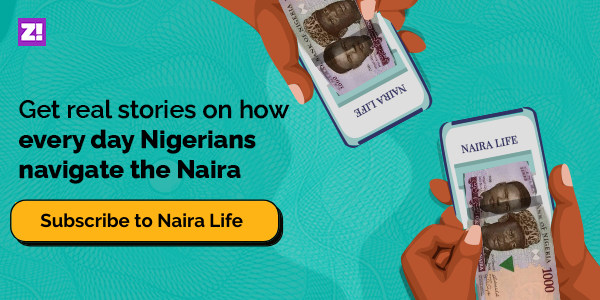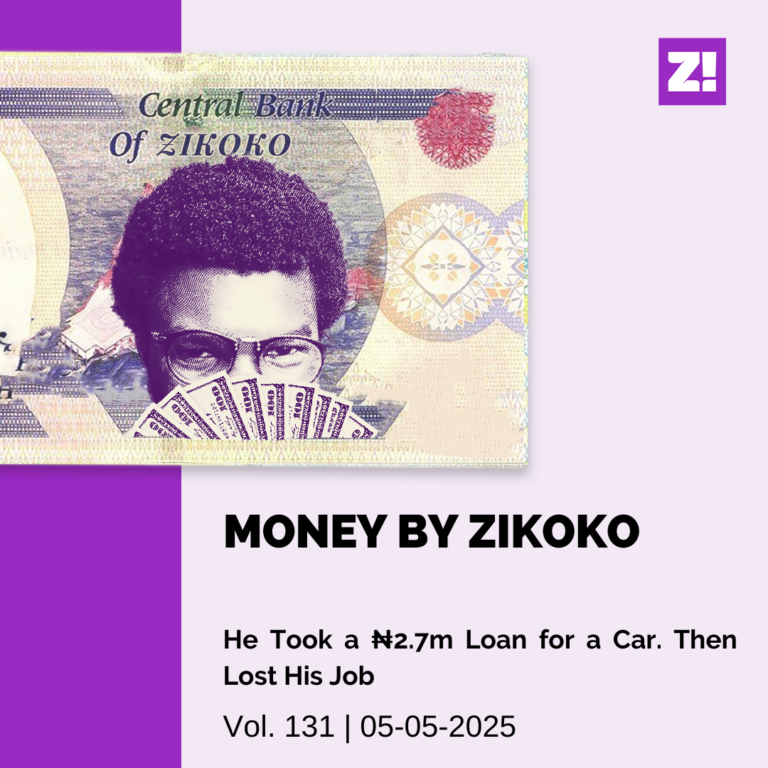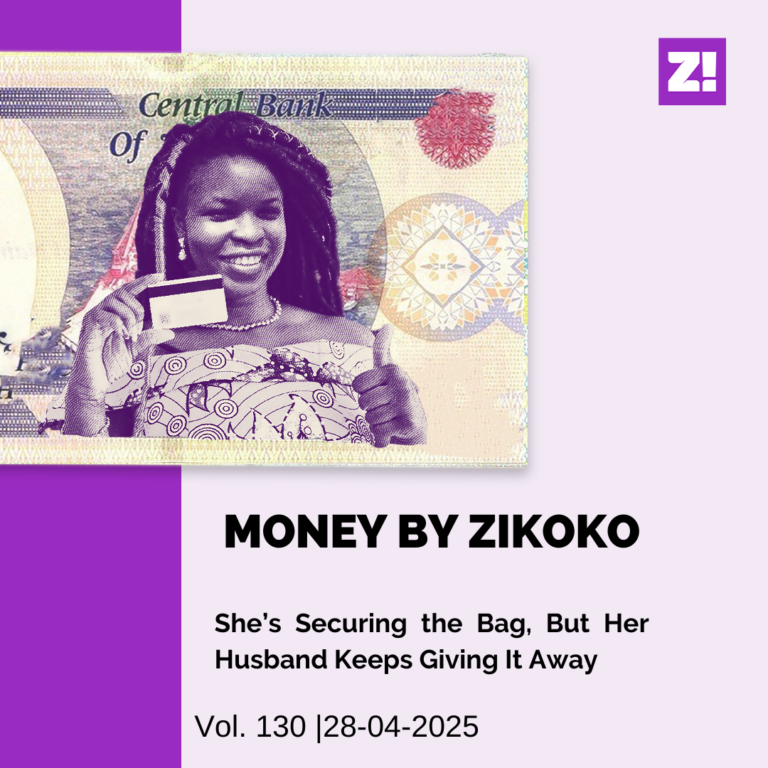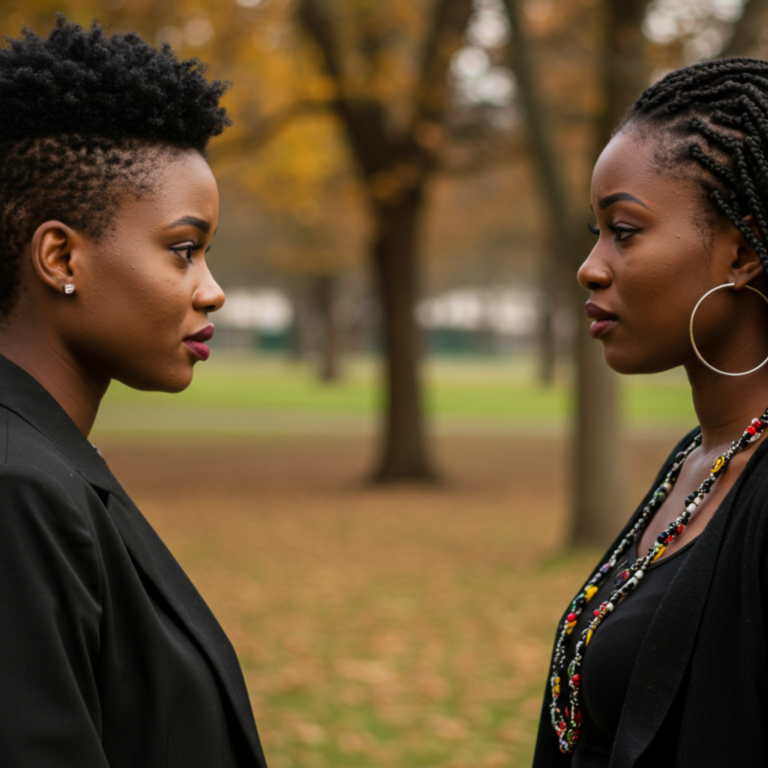Every week, Zikoko seeks to understand how people move the Naira in and out of their lives. Some stories will be struggle-ish, others will be bougie. All the time, it’ll be revealing.
The 35-year-old in this story was forced out of his home after a Boko Haram attack in 2016. Subsequently, he came to Lagos to start over, and he was getting back on his feet until a government decision set him back.
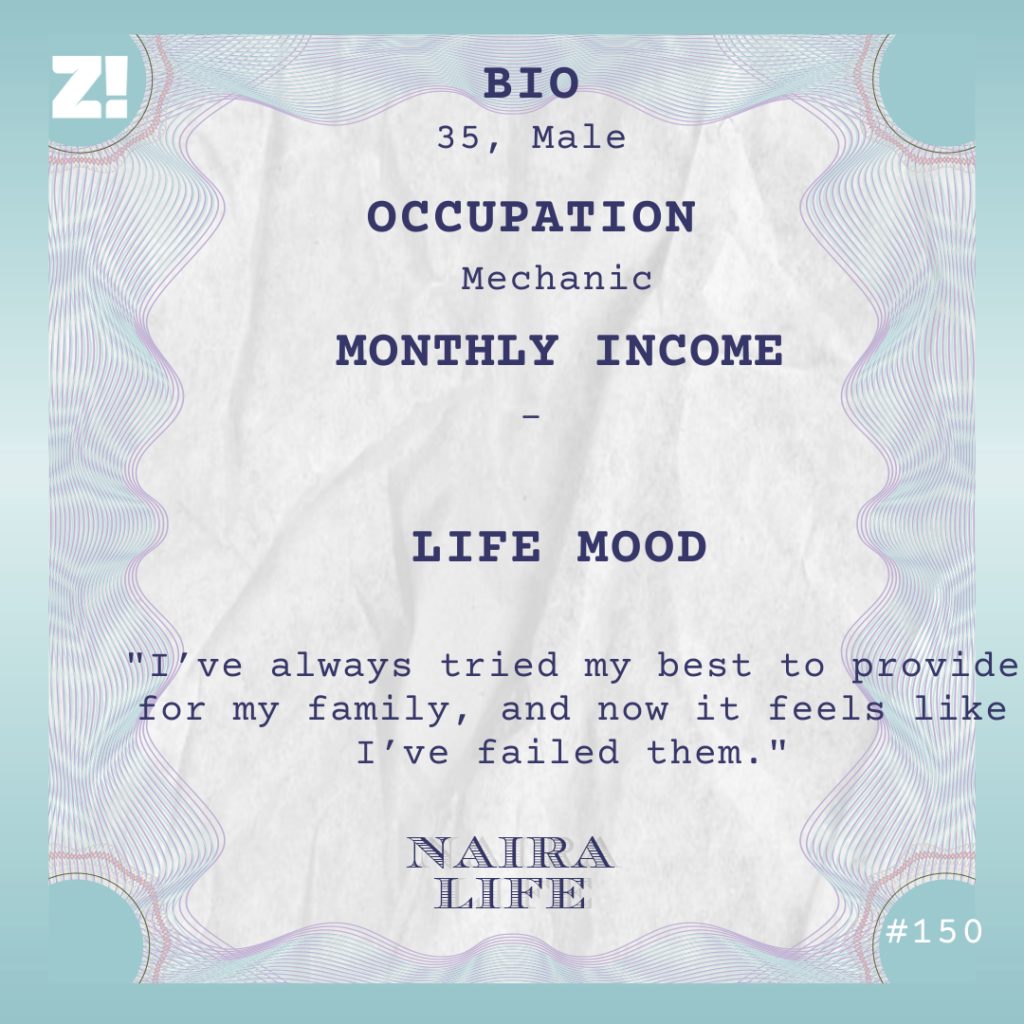
When was the first time you knew what money meant?
In the early 90s, I used to hawk pepper with my mum every afternoon after school. It was from whatever we made she took ₦2 or ₦3 to give me every morning to take to school. This was how I knew that you had to work to make money. I was 10 years old.
Could you paint me a picture of what things were like growing up?
My mum was a farmer who sold things on the side, and she was all my younger sister and I had. My dad wasn’t in the picture — he was in Chibok, my hometown. I don’t have the details but they had issues they couldn’t get past after my sister was born. Eventually, my mum left him and took us with her to Toto in Nasarawa State where her family was.
Things were a little rough for the first few years, but she tried her best to provide for us. But I had to get involved as soon as I could to help, and that’s why I started hawking with her. When I was in JSS 3 in 2001, my mum stopped me from hawking because she thought I was getting too old for it. Things had gotten better too — she had raised money to set up a small store where she sold foodstuff. We were doing better than ever.
Sadly, my mum passed away a year later in 2002.
I’m so sorry.
My sister and I moved in with my mum’s sister, who was also a farmer. However, money was always a problem and she struggled to raise us with her own kids. After living with her for two years, I made a decision.
What was that?
I would go to Chibok to look for my dad. I convinced my aunt to let me go, and she even gave me ₦6k. After two days on the road, I arrived at Chibok. I didn’t have a lot of trouble finding my family home, and for the first time in years, I saw my dad.
Do you remember what that felt like?
I don’t know but I’ll tell you what he did: he embraced me for a long time, then he took me to the rest of the family and introduced me as the son he had been talking about. At that moment, I knew my sister and I were coming home and we would be okay.
A week or two after I arrived, he sent money to my sister in Nasarawa and she joined us in Chibok.
Sweet. What happened after?
Nothing much happened in the first four years except helping him on his rice farm. In 2008, he asked me about my plans for the future. I was in SS 1 when my mum died, but going back to school wasn’t an option anymore. First, he didn’t have enough money to send me to school. Also, the quality of the government-owned schools there were bad, so I didn’t see a point in going to one of them.
What did you decide on then?
I was interested in cars and wanted to know how they work. I told him I’d like to learn how to be a mechanic. He knew someone who had a workshop in Maiduguri and asked him if I could be one of his apprentices. In September 2008, I moved to Maiduguri to start my apprenticeship. I was with my boss until 2014.
Six years?
Yes. My boss liked to do everything well. So he didn’t talk about my graduation until he was sure I could work on any petrol or diesel engine.
Omo. What were things like during those years?
I was comfortable. I lived with him for the entire time and he fed me and the other apprentices. In return, we helped around the house and took care of the workshop. I was making some money here and there too — customers who came to the workshop sometimes tipped us money when we worked on their cars and it was anything from ₦100 to ₦300. In a month, I made an average of ₦3k from tips, which I always sent to my sister in Chibok because I didn’t have much need for money.
When I finally graduated in 2014, my boss gave me a space in his workshop because he knew I didn’t have enough money to set out on my own. He even sent some of his clients my way.
Your boss sounds like a nice person.
He was. I started working on cars and keeping all the money I made. In the first few months after my graduation, I was making between ₦6k and ₦8k monthly. One of the first things I did was move out of my boss’s home to rent my own space, and I got a room for ₦250/month. I was starting my life.
Later in 2014, my dad died after a short illness. There was nothing for my sister in Chibok anymore, so I brought her to live with me in Maiduguri. She lived with me for only a year though.
Why, what happened?
She got married in 2015 and moved in with her husband. I thought it was time for me to finally settle down too. I had someone I was interested in already, so it took only a few months after my sister’s wedding before I did mine too. It was a small one, and I’m not sure I spent up to ₦5k.
What were things like financially after you got married?
I was still at my boss’s workshop, making about ₦1k every day. After sorting out transportation and lunch, I’d bring about ₦600 home, and that would go to my wife. On the good days, there was extra to save.
It wasn’t a lot but things were easy, at least until Boko Haram became a problem.
Tell me about that.
The attacks had started small-small since 2010. But it became more serious in 2013 after the Chibok kidnappings. Soldiers took over the whole state, and we had to adjust to a new life. There were checkpoints everywhere, curfews everywhere. The sad thing about this was that people weren’t going out as much, which meant that there weren’t cars to repair anymore.
My son was born in 2015, in the middle of all this. In 2016, I moved the family to Mule — a small town in Maiduguri. I thought we would be safer there. I was wrong.
Ah.
I cannot forget the day Boko Haram attacked my community. The gunshots started around 4 a.m. Then bombs followed. I hid my family in our room because there was nowhere else to hide. We laid there until soldiers came later in the morning and said we could come out. I looked at my five-month-old son and realised that he could have died. I decided to leave Maiduguri that morning. Three days later, I returned to my aunt in Nasarawa. I didn’t have to worry about my sister — she and her husband had gotten out of Maiduguri.
How did you manage to get out?
It was a struggle. We didn’t have enough money for the journey — my wife and I had ₦4k between us, which couldn’t get us far. Thankfully, we found a truck carrying watermelons to Damaturu. From Damaturu, we joined a vehicle going to Nasawara. It was a difficult journey, but we were safe at last.
I can’t imagine how tough that was.
I had to start all over again. I stayed in Nasarawa for a month before I left my wife and son and came to Lagos. This was November 2016.
Why did you come to Lagos?
I had an uncle who worked as a driver for a company, and he said he would accommodate me and help me find work in the city. And he did. I got my first job in February 2017.
Tell me about the job.
It was at a security company, and I was hired as a mechanic to work on their trucks. The pay was ₦15k.
Your first official salary.
Yes. I was living with my uncle, so rent and feeding wasn’t a problem. Because of that, I could send ₦10k to my wife every month. The rest went mostly towards my transportation expenses. There was hardly anything left to save after that.
However, I wasn’t enjoying the job. I was working long hours without extra pay. After a few months, I realised that the money wasn’t worth the stress. I left the job in December 2017.
Did you find something else before you quit?
Something like that. Someone gave me a fairly-used okada on a hire-purchase agreement. I was supposed to pay him ₦200k for it, and the plan was that I would deliver ₦7k to him every week.
How did this go?
It took me a year before I could complete the payment, and it felt like I was working for him the whole time.
I was making about ₦2k – ₦2500 every day, but the policemen, area and union boys would harass me and take from what I’d made. After everything, I would have only about ₦1200 left, and some of it would still go into buying fuel.
It broke my heart to do this, but I had to reduce the money I sent home to my wife to ₦7k per month. Whatever else I made went into paying the guy who gave me the okada. Still, I couldn’t meet the December deadline he gave me to complete the payment, and he threatened to take the bike away from me. I had ₦25k left to pay o. Thankfully, my uncle stepped in and gave me the money.
But he also asked me to stop the bike work one month later.
Why?
I had an accident, and I spent a few days in the hospital because of it. When I came out of the hospital, I started looking for a new job and found one as a mechanic in a workshop. The salary was ₦25k/month. I was managing that until I was robbed on my way back from work one night. I quit the job the following day.
I decided that I had no choice but to return to riding okada. In April 2020, I sold my old bike for ₦70k and added it to the ₦60k I had in my savings and used the money to buy a new okada.
How did it go this time?
It was much better because everything I made was mine. I only worked early in the morning and late at night because I didn’t want anybody to harass or arrest me. On average, I made between ₦2500 and ₦3k every day. I made sure that I saved ₦2k from whatever I made in a day — ₦1k went to a daily contribution I was in and ₦1k went into my own savings.
You were saving about ₦60k every month.
Yes. My main concern was sending money to my wife every month, and I was able to send at least ₦20k. Things were good and I was very happy about it.
In December 2020, I thought it was time to bring my family to Lagos, and I did that. I moved out of my uncle’s place and rented a small room that cost ₦1500/month.
I imagine it was great finally having your family with you.
I was so happy, and I promised myself to work harder. Unfortunately, the Lagos state government banned okadas in February 2020, and that started to affect me. I couldn’t stop it totally because it was all I had to take care of my family.
How did the ban affect your earnings?
I had to stay off the main roads, so I wasn’t making as much. It was a struggle to make up to ₦1500 per day in the first few months of the ban. The police started harassing me more for money too. But the biggest people to worry about were Task Force — those ones would take your bikes away.
Things started to calm down after a few months, and I thought it was over. After the lockdown, all of us started returning to the major roads. Nothing else happened until March this year.
What happened in March?
I only work within the mainland because of Task Force, but a customer begged me to take them to the island. He said he was late for an interview and promised to pay me ₦1500, so I decided to risk it. The moment I dropped him and wanted to turn back, a Task Force vehicle pulled up and their officers jumped out. It was too close and there was no way for me to drive away. They grabbed me, pulled me off my bike and took it away. Till today, I haven’t seen my bike.
I went to their office a few times, but the people I met there said there was nothing I could do to get it back and advised me to let it go.
Ah.
I had about ₦60k in savings at the time. I took the money to the market and bought foodstuff for the house. My wife said she would use some of the beans I bought to start a small akara business. This happened for some time, and it brought some money in. Unfortunately, a paint of beans that used to cost between ₦1200 and ₦1500 went up to ₦2500 – ₦3000. When we realised that she couldn’t sell akara anymore, we raised ₦10k and she switched to selling pap.
Do you have an idea how much this brings in?
₦1700 – ₦2000 on a very good day, and that’s everything we live on. I think about this, and I feel so sad. But there’s nothing I can do about it until I find a new job.
How much do you think would be great for you right now?
I want to say ₦60k/month, but I also know that I’ll take whatever I see now — it will get me to my plan faster. I want to return home to Maiduguri because it would be cheaper to open a workshop. Life is better there, and I feel like my family will be happier first. But I need money to do all this.
How would you say your experiences have shaped the way you see money?
For me, I think there are some things you shouldn’t do when you don’t have money and one of them is giving birth to a child. Sometimes, I look at my son and feel so guilty. It’s like I brought him here to suffer. He’s almost six now and is not in school. He stopped going to school after they took my okada. I feel like I’ve failed him.
I’m sorry you feel that way. Do you remember the last thing you spent money on that made you happy?
I don’t know how much I spent bringing my family to Lagos, but that would be it. I felt complete when they came here. My wife and I would share stories about the past every night and we would laugh about them. I was truly happy.
On a scale of 0-10, how would you rate your financial happiness?
3. I’ve always tried my best to provide for my family, and now it feels like I’ve failed them. I’m only happy when they are and even though my wife doesn’t complain and my son is still young, I don’t think they are happy. And every day, I feel like it’s my fault. This number can only go up when I start earning again.
UPDATE: Upon request from readers, we’ve added a payment link for people interested in sending him some love and light here.

